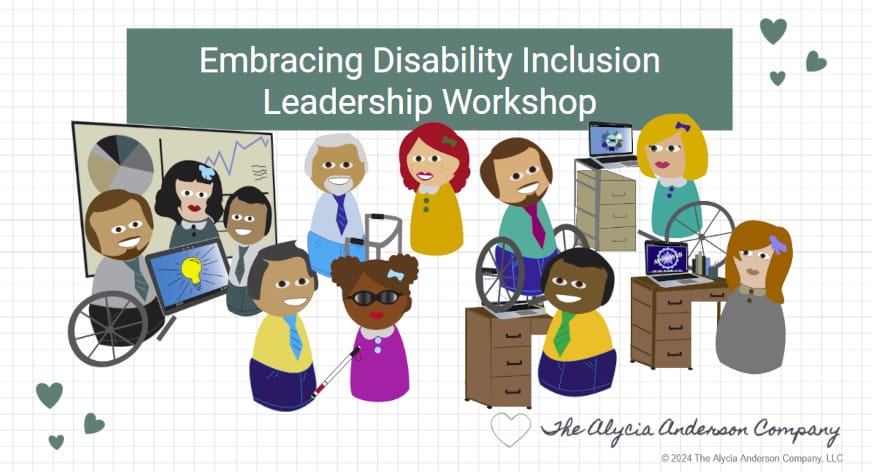
Embracing Disability Inclusive Leadership Workshop
Disability Inclusive Leadership is a management approach that actively seeks to integrate individuals with disabilities and accessibility practices into the fabric of an organization. It recognizes the abilities, perspectives, talents, expertise and values found in the disabled workforce that contribute to an organization’s success and can be leveraged strategically to lead to innovation.
The idea of disability inclusion in the workforce at wide scale is brand new and your leadership needs training and education on why it is so vital to your businesses.
Our Embracing Disability Inclusion Leadership Workshop is a culmination of our experiences in working as disabled employees in the workforce for decades and a mix of all we have been learning in speaking to companies globally for the past several years. We believe for true disability inclusive initiatives to take hold at companies, institutions and organizations it needs to start with buy in from the leaders who run them.

Facilitated Workshop Overview
Alycia’s facilitated leadership workshop equips managers and executives to embed Disability Inclusive Leadership (DIL) across culture, policy, and day‑to‑day team practices. The session blends concise instruction with discussion, reflection, and scenario work focused on awareness, accountability, accessibility, and measurable behavior change.
Audience & Goals
Designed for senior leaders, people managers, HR/TA, ERG/BRG sponsors, and influence leaders responsible for building inclusive teams and systems. Participants leave with shared language, a clear business case, and practical actions to lead authentically, reduce barriers, and motivate ongoing progress.
Workshop Structure
Principles of Disability Inclusive Leadership
- Examine intersectionality through the lens of access; integrate accessibility into culture strategy; and understand why Disability Inclusive Leadership drives performance and impact.
Creating Awareness & Building Empathy
- Lead authentic disability‑inclusive teams; practice accountability, awareness, inclusion; embrace equity; nurture team dynamics that support disability inclusion.
Barriers, Solutions & Outcomes
- Address ableism, implicit bias, and microaggressions; elevate the importance of language; build psychological safety and support self‑identification; apply change models to overcome resistance.
Motivating Teams to Move Forward
- Convert insights into specific leadership commitments; reinforce continuous improvement and momentum.
Learning Outcomes
Leaders will be able to:
- Understand DIL and connect it to leadership strategy, access, and measurable organizational impact.
- Recognize how intersectionality shapes workplace experiences and outcomes.
- Identify and interrupt ableism, implicit bias, and microaggressions using respectful, precise language.
- Strengthen psychological safety to support disability self‑ID and inclusion.
- Apply change frameworks to lower resistance and sustain progress.
- Commit to concrete leadership behaviors that drive inclusion, accessibility, and accountability.
Core Topics Covered

- Disability as a dimension of diversity: prevalence, types, and complexity; why it’s an “us” conversation.
- Intersectionality and its impact on access, employment, and policy.
- Integrating access and belonging into culture and systems.
- Leadership practices: accessibility & accommodation, equal opportunity, open communication, empathy, policy advocacy, education, and awareness.
- Barriers & change: ableism, bias, microaggressions; Kotter, Lewin, and Prosci models in action.
Format & Facilitation
- Facilitated workshop with leader‑level discussion, Q&A, and reflection woven into each section; emphasis on language practice and real‑world scenarios.
- Opening alignment on principles, periodic pause‑and‑reflect prompts, and a closing commitment capture for accountability.
Materials & Deliverables
- Leadership slide deck, discussion prompts, and leader action checklist.
- Post‑session recap with commitments and next‑step recommendations.
